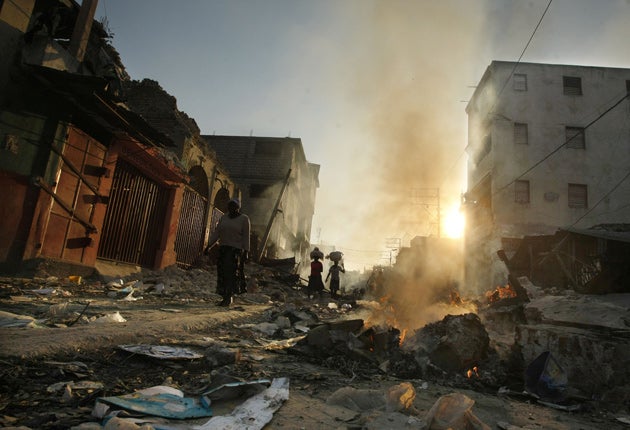Poets take up pens in aid of Haiti
Carol Ann Duffy organises charity event for earthquake victims

When Carol Ann Duffy heard about the cataclysmic earthquake in Haiti, the Poet Laureate felt it was not enough to pull out her credit card and donate some money to those left suffering in its wake.
Instead, she contacted 23 of Britain's most eminent poets to mobilise them for one of the biggest charity poetry jamborees for decades. Two hours after she requested their help, she had received a deluge of enthusiastic replies. Some pledged to write new poems relating to the disaster, while others said they would read verses filled with love, humour, sadness and death, some to music, to mark the moment.
Poetry Life for Haiti, which will take place tomorrow at Westminster Central Hall, has been billed as Band Aid for poets. Roger McGough, the former poet laureate Andrew Motion, Brian Patten, the national poet of Wales Gillian Clarke, Elaine Feinstein, and the Costa-prize winning Christopher Reid will all be taking part, as well as Duffy herself.
McGough has written a moving poem describing the plight of the Haitians for the event, as has Clarke with an elegiac work entitled Lament. Feinstein's contribution is called Port-au-Prince, and begins with the words: "Hell has many landscapes".
The poets hope to raise tens of thousands of pounds, with proceeds going to the Disaster Emergency Committee's Haiti Earthquake Appeal. The event is being supported by the Hay Festival. Duffy said: "Everyone in the world has been deeply moved by the images that are coming out of Haiti. It's not just the earthquake but the problems that it has caused.
"It was a defining moment in how we respond. I'm a poet and know many other poets who have felt the same way. So I made a wish list and sent out emails to them all. A couple of hours later they had all emailed back saying yes, apart from two who would have loved to take part but they are in Sri Lanka."
Duffy said that she would conduct the laureateship – appointed to a woman for the first time in history – with a "hands-on" style of leadership. "One of the blessings of being poet laureate is that I can try to make poetry central to the lives of our country. That's all I have to do," she said.
Speaking of her decision to act after the disaster, Duffy said: "Poetry is the music of being human. We all suffer bereavement, distress, fall in love, have children. The reason there has been this huge reaction to the earthquake is because we imagine the horror of it.
While Duffy will read out poems from her collections, McGough will perform a newly-written work called They Came Out Singing to music in an eight-minute appearance on stage. Those unaccompanied by music will speak for six minutes at a time. McGough said he was delighted when Duffy mentioned the idea to him and that a "Band Aid" style approach to world events was a welcome move for many poets.
"Poets want to do things like this. Sometimes they feel cut off. If you write a poem about an event, it is often difficult to get it published. But poetry is just the right thing to mark certain times in life, and this is one of them," he said.
Port-au-Prince, by Elaine Feinstein
Hell has many landscapes: some torments
men inflict on one another, others we acknowledge as natural accidents. The images of Port au Prince enter
our homes each night: collapsing houses, smashed limbs, corpses, broken girders, air pockets where a man may lie
for ten days unheard, and when found still die. A child in the rubble with no mother, and no shelter. The trucks run out of water.
Poor city of the first Black independence, Creole children of slavery and sugar-cane, victims of Papa Doc and Voodoo! Yes,
there will be looting and violence; but after so often failing in compassion if we continue, nevertheless, to fly in
tents and medicine, who knows, it might redeem the human race
They came out singing, by Roger McGough
They came out singing, many of them.
Pulled from the rubble, broken bodies
from broken buildings. Coated in dust,
red-eyed and bruised, crushed bones
and severed limbs. Days of sepulchral
darkness, nights choked with disbelief.
First the smile, wide as thanksgiving,
then the song, praise to the rescuers,
and God for his mercy. Merci, merci.
Lament, by Gillian Clarke
For the earth that shivered its skin like an old horse
For the shout of the sun, of the earth as it broke its heart
For the white palace that fell into itself like snow
For the hospital, for its rows of white graves
For the cathedral that folded on emptiness
calling God's name as it went
For its psalms of sorrow, the prayers of the living and dead
For each house crushed with its cots and cushions and cups
cooking pots pressed between pages of stone
For the small lung of air that kept someone alive
For the rescuer's hand reaching into the void
For the slip of a life from its grip
For the smile of daylight on a woman's face
For her daughter dead in the dark
For the baby born in the rubble
For tomorrow's whistling workmen
with their hods of bricks
For scaffolding and walls rising from the grave
over rosaries of bones
Join our commenting forum
Join thought-provoking conversations, follow other Independent readers and see their replies
Comments